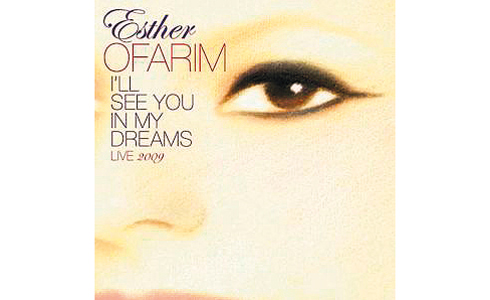אסתר עופרים: לא רק לחובבי הזמר העברי
יום רביעי 17 בפברואר 2010 03:00 מאת: בן שלו
גם אחרי 50
שנה במקצוע,
המנעד
הסגנוני של
אסתר עופרים
רחב להפליא.
האלבום החדש
שלה בהופעה
מתאים לא רק
לחובבי הזמר
העברי

אסתר עופרים בהופעה במינכן, 2005. כל שיר נבחר
בקפידה (תצלום: אימג' בנק / Getty Images)
אסתר עופרים הופיעה לפני כמה שבועות בהיכל התרבות בתל אביב.
רגע, אסתר עופרים הופיעה לפני כמה שבועות בהיכל התרבות? איך זה שאף אחד לא הודיע על כך מבעוד מועד, או לפחות דיווח איך היה? עופרים, שחיה בגרמניה, הרי לא מכבדת אותנו בנוכחותה כל שבועיים. ובכן, מתברר שזאת היתה הופעה לגמלאים, שלא היתה פתוחה לקהל הרחב (האתר היחיד שדיווח עליה היה מוטק'ה - נקודת מפגש לצעירים ברוחם).
ההופעה היתה מצוינת, מספר מישהו שהיה שם, וייתכן כי החוויה המוצלחת היתה אחת הסיבות לכך שעופרים החליטה להופיע שוב, והפעם לפני כל מי שאוהב את קולה, מנער עד זקן. ההופעה תתקיים ב-18 במארס בתיאטרון ירושלים.
עופרים הוציאה לפני כמה חודשים אלבום חדש בהופעה.
רגע, עופרים הוציאה לפני כמה חודשים אלבום חדש? איך זה שאף אחד לא הודיע על כך מבעוד מועד, או לפחות דיווח על תוכנו ואיכותו? פשוט מאוד: האלבום, "I'll See You In My Dreams", שהוקלט בהופעה בהמבורג בתחילת 2009, יצא בחברת תקליטים גרמנית שאלבומיה אינם מופצים בישראל בצורה מסודרת, ומכאן דממת האלחוט שקיבלה את פניו. חבל. זה אלבום יפה מאוד. הרבה אנשים יכלו ליהנות ממנו, ולא רק חובבי זמר עברי.

אסתר עופרים,
1975
מבט על רשימת השירים שעופרים בחרה לבצע, עוד בטרם ההאזנה הראשונה, מעורר חשש לאקלקטיות מוגזמת. יש כאן שיר עם אמריקאי ("My Fisherman, My Laddie-o"), שיר עם אירי ("My Lagan Love"), שיר אנגלי מהמאה ה-16 ("The Willow Song"), הימנוני פופ ("יסטרדיי", "הללויה"), שירים של ברכט ווייל ("Alabama Song", "Surabaya Johnny"), שירים ממחזות זמר אמריקאיים ("I'll See You In My Dreams", "I Have Dreamed"), שיר בלדינו ("Adio Querida"), שני שירי זמר עברי (שניהם של מרדכי זעירא, "מה אומרות עינייך" ו"נעולה היא דלתי"), ואיך אפשר בלי "סינדרלה רוקפלה".
הופעות של "קצת מזה וקצת מזה" הן לעתים קרובות שטחיות ומרפרפות, אבל החשש שעופרים יורה ליותר מדי כיוונים מתפוגג מהר מאוד. הנוסחה שלה היא "קצת מזה וקצת מזה, אבל לעומק". על אף הריבוי הסגנוני הקיצוני, אין אפילו לרגע תחושה של סופרמרקט. ואם יש, זהו סופרמרקט של אצילים. כל שיר נבחר בקפידה, עובד בקפידה, נוגן בקפידה וכמובן הושר בקפידה. בשביל אלבומים כאלה המציאו את הביטוי "בטוב טעם".
עופרים היתה מאז תחילת הדרך זמרת מגוונת מאוד, ואחרי 50 שנה במקצוע לא פלא שהמנעד הסגנוני שלה רחב להפליא. אבל זה לא רק עניין של ותק ושל סגולות ווקאליות טבעיות, אלא גם, ואולי בעיקר, עניין של גישה. כשעופרים מבצעת שיר עם אירי או שיר אליזבתני ואפילו סטנדרט מברודוויי או שיר של ברכט ווייל, נדמה שהיא יודעת כיצד למצוא את הנקודה העדינה והאלגנטית שבה היא מספיק קרובה לשיר אבל לא יותר מדי קרובה אליו. זה שילוב מוצלח בין אינטימיות לבין ריחוק הכרחי. עופרים מפרשת את השירים, אבל כפי שאומרת שורת המפתח של "מה אומרות עינייך", היא עושה את זה "בלי לומר עד תום".

עופרים נהנית מהעיבודים החכמים ומנגינת הפסנתר של יוני רכטר, המנהל המוסיקלי הקבוע שלה, ומשלושה נגנים מצוינים נוספים: הכנר מיכאיל פוולץ, הגיטריסט ברנרד פיכטנר והבסיסט מיכה קפלן, ישראלי תושב ברלין. גם הם נעים על הציר שבין קרבה לריחוק, בעיקר בשירים ששמענו כבר 1,001 פעמים. ב"יסטרדיי", למשל, או ב"מה אומרות עינייך" אין שום יומרה לפרשנות רדיקלית, אבל יש משחקי קצב ושינויי הרמוניה ושזירה של חוטי קונטרפונקט, וכל אלה גורמים לשיר השחוק מרוב שימוש להישמע רענן.
ארץ המוצא של האלבום הזה, גרמניה, ניכרת היטב במחיאות הכפיים שנשמעות בסוף כל שיר. הן נחתכות בשיטתיות אחרי שנייה וחצי, הקפדה שיוצרת אווירה אירופית מאופקת וצוננת. אחרי השיר האחרון מפיקי האלבום ממש משתוללים: הם חותכים את מחיאות הכפיים של הקהל אחרי חמש שניות. בהופעה של עופרים בתל אביב בחודש הבא (עם רכטר, הסקסופוניסט גורי אגמון, החלילן אילן סאלם, הגיטריסט יוסי לוי והבסיסט מיקי ורשאי, ועם רפרטואר שיכלול בעיקר זמר עברי) מחיאות הכפיים יימשכו מן הסתם הרבה יותר זמן. "בלי לומר עד תום, עד תום".
אסתר עופרים - "I'll See You In My Dreams". טרופיקל מיוזיק
article taken from mouse.co.il